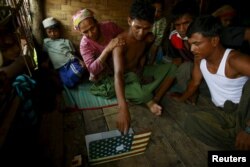In Bangkok, a meeting of senior regional government officials called for greater coordinated action in dealing with irregular migration in the Indian Ocean.
The meeting Friday of senior officials and experts on irregular migration follows a similar gathering in May that was called to deal with a humanitarian crises of thousands of boat people stranded at sea.
Most of those on the move are Muslim Rohingya, fleeing repressive policies in western Myanmar and impoverished Bangladeshi nationals seeking employment in Muslim Malaysia and Indonesia.
On Friday, Thai Foreign Minister Don Pramudwinai called for concerted long-term action to tackle irregular migration.
Clear needs
“It’s clear that we need an explicit and efficient mechanism to manage and control the negative impacts of irregular migration. We must always keep in mind that irregular migration has a human face -- we must therefore do all that we can to uphold out humanitarian traditions and the very sanctity of human life itself,” Pramudwinai said.
The United Nation’s International Office for Migration (IOM) in its latest situation report said of the more than 5,500 people who departed from Myanmar and Bangladesh between May 10 and July 30, more than 1,900 remain in shelters and immigration detention centers in Indonesia, Thailand, Malaysia and Myanmar.
More than 2,200 Bangladeshi boat people had returned to Bangladesh with IOM assistance.
The Rohingya remain stateless. Myanmar authorities do not recognize them as one of the country’s ethnic groups. Authorities refer to them as Bengalis, with laws imposing tight restrictions on movement and employment.
Thai Foreign Minister Don says the issue needs to be addressed comprehensively by all stakeholders ranging from prevention to ‘cure’, and include economic development support in regions to reduce the “push” that leads to the Muslim Rohingya and Bangladeshis setting off on boats.
At a later press conference, Don expressed hope sustainable solutions will be found to avoid future crises.
“Hopefully – we feel we want it we’re really looking forward to it – the sustainable solution – but it might not come from this second meeting – we have hope, our earnest hope that all the efforts, combined focus they would attain this goal,” Don said.
Dialogue with Myanmar
Senior diplomats told VOA the Thai government wants to have a dialogue with Myanmar for a plan of action so both countries can avoid the paralysis that occurred in May when thousands of irregular migrants were abandoned at sea.
Diplomats say how quickly elected National League for Democracy (NLD) leader Aung San Suu Kyi responds to the proposals will be key once her party assumes power next year.
IOM’s director general, William Swing, said further regional dialogue was necessary to ensure long-term solutions were in place.
“It is not so much a migration problem to be solved it’s much more a human reality to be managed. Everything now depends on regularity of meetings, having a dialogue that continues. As you work with some of these issues that are both complex and intense – so you have to keep the dialogue going,” he said.
The next step will be a March meeting in Indonesia of foreign ministers from the 45-nation "Bali Process" to address irregular migration, and what diplomats say is expected to provide “strong capacity building” to support the outcome of meetings in Thailand.








